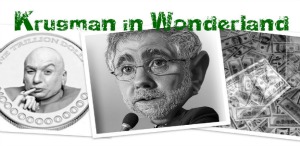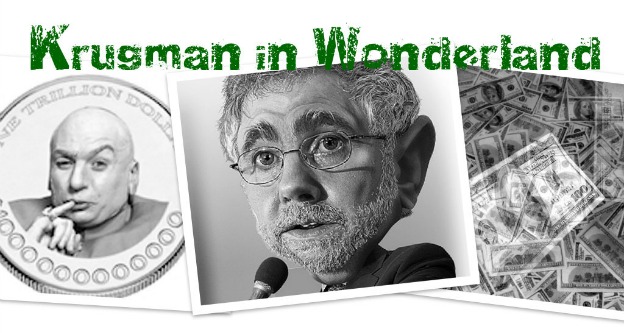Krugman is a Keynesian ‘crank’ wanting to empower the inflation fairy
Lest anyone think that Paul Krugman is an economist, his latest column bemoaning the lack of hardcore inflation presents every reason as to why he is a crank, although a famous crank.
Yes, the Inflation Fairy has the answer: sprinkle magic dust and watch it turn into money, lots of money. We’ll all be rich!
Let us read Krugman in his own words:
…at this point, inflation — at barely above 1 percent by the Fed’s favored measure — is dangerously low.
Why is low inflation a problem? One answer is that it discourages borrowing and spending and encourages sitting on cash. Since our biggest economic problem is an overall lack of demand, falling inflation makes that problem worse.
Low inflation also makes it harder to pay down debt, worsening the private-sector debt troubles that are a main reason overall demand is too low.
But it gets better:
So why is inflation falling? The answer is the economy’s persistent weakness, which keeps workers from bargaining for higher wages and forces many businesses to cut prices. And if you think about it for a minute, you realize that this is a vicious circle, in which a weak economy leads to too-low inflation, which perpetuates the economy’s weakness.
And this brings us to a broader point: the utter folly of not acting to boost the economy, now.
One can surmise that Krugman really believes that if Ben Bernanke were to unload his proverbial helicopter and shower Americans with lots of money to the tune of, say, a million dollars apiece, then the economy would have plenty of demand and everyone would be rich. It would be so easy. Granted, the Inflation Fairy would have a beard and her wings would look like helicopter rotors, but she still could turn magic dust into money.
There is another reason I say Krugman is no economist, and the following statement demonstrates my point:
From the beginning, it was or at least should have been obvious that the financial crisis had plunged us into a “liquidity trap,” a situation in which many people figure that they might just as well sit on cash. America spent most of the 1930s in a liquidity trap; Japan has been in one since the mid-1990s. And we’re in one now.
Economists who had studied such traps — a group that included Ben Bernanke and, well, me — knew that some of the usual rules of economics are in abeyance as long as the trap lasts. Budget deficits, for example, don’t drive up interest rates; printing money isn’t inflationary; slashing government spending has really destructive effects on incomes and employment.
 Perhaps the most important “rules” of economics to be “suspended” by a “liquidity trap” is the Law of Opportunity Cost and the Law of Scarcity, or so Krugman would have us believe. Interestingly, he wants us to believe that by the simple act of printing lots of money, government essentially is creating real wealth, as in Krugman’s view, governments self-generate wealth.
Perhaps the most important “rules” of economics to be “suspended” by a “liquidity trap” is the Law of Opportunity Cost and the Law of Scarcity, or so Krugman would have us believe. Interestingly, he wants us to believe that by the simple act of printing lots of money, government essentially is creating real wealth, as in Krugman’s view, governments self-generate wealth.
For all of the Keynesians out there who believe that the real problem is “idle resources” that can be “stimulated” by government doling out lots and lots of new cash, one must remember that after the new money has been farmed out to the economy, people will act, whether they pay down debts or use it to spend on consumption goods.
However, what they want us to believe is that after the Inflation Fairy unloads her magic dust and people have gone on a spending spree, somehow the economy then will magically arise and move forward. All that was needed was some “pump priming”!
But why should that be the case. Why should the act of dumping a lot of new money on people give long-term revival to the economy? How is it that a bunch of new money the first time around would awaken the owners of those “idle resources” but not be needed for round two and beyond? Krugman writes of the economy “gaining traction,” but he never explains what it means.
This last point is important, for Krugman and his followers want us to believe that after a massive round of distributing new money (and the new money always goes to those most in need), the prosperity that follows will move into ever-widening circles and spreads employment to the unemployed. In other words, Krugman wants us to believe at least a little bit more inflation will bring hope:
I wrote recently about how, by allowing long-term unemployment to persist, we’re creating a permanent class of unemployed Americans. The problem of too-low inflation is very different in detail, but similar in its implications: here, too, by letting short-run economic problems fester we’re setting ourselves up for a long-run, perhaps permanent, pattern of economic failure.
It has been a long time since an economist was publicly willing to claim that inflation would bring prosperity, give that a lot of us still remember the huge inflation that occurred around 1980, and it was not a wonder drug. (Krugman would argue that we were not in a liquidity trap, so the laws of economics were different.)
But here is the problem: over time, a new bounce in the economy becomes dependent upon yet another round of inflation. At first, inflation seems to be a miracle cure, as no doubt a bunch of new money in the hands of at least some people will make them better off relative to others. They will spend or maybe pay off some debts and be able to purchase things at prices that reflect the time before the surge of new money. (It takes a while for the money to work its way through the economy and finally push up prices, although the process of increasing prices will be uneven.)
But then what? Because it was the inflation that produced the temporary surge in activity, the only way to replicate the economic bounce is to inject another round of new money. This time, the “good” effects are not quite as good and the “bad” effects become a little more pronounced. One can understand what happens as this process is repeated time and again.
When the 1960s began, even though the economy was in a recession, nonetheless times overall were pretty good and inflation was low. As the government began to grow massively during the next decade and the American military venture into Vietnam metastasized, the government, through the Fed, turned to more and more inflation. By 1965, all silver coins were gone (although the government insisted that the new “sandwich” coins were just as valuable as the old silver ones), and by 1971, there was a monetary crisis.
The theme of Krugman’s column is that inflation itself can bring prosperity to an economy languishing in a “liquidity trap.” I have no doubt that a massive injection of money into the hands of people like me would have a stimulative effect — at first. As I noted before, this would not be real prosperity, but rather a trap. Unfortunately, Krugman really does believe that inflation — the debasing of the marginal unit of money — is the key to a new prosperity.
And it all comes out in three words: not enough inflation. It is better spoken in two words: Inflation Fairy. Or maybe it is better spoken in one word: insanity.
William L. Anderson is an author and an associate professor of economics at Frostburg State University in Maryland. He is also an adjunct scholar with the Mackinac Center for Public Policy as well as for the Ludwig von Mises Institute in Alabama.
Read more at “Krugman-in-Wonderland”
















[…] […]
[…] […]
Oops? Gold has been the best performing asset class over the past decade, far outpacing the gains in stocks. Even with the recent correction, those that invested in gold at the beginning of the decade are WAY ahead of those invested in the stock market, real estate or just about anything else.
Universities are indoctrination camps. It does not matter who went to what school or who has the more prestigious piece of paper on their wall. Wake up man! The “brightest” economists from the best universities have been wrong time and time again in the recent history.
This author’s point about money printing being an unsustainable means for promoting long-term growth is spot on. It is akin to expecting long-term happiness from heroin. You go ahead and invest in overvalued stocks or the mega-bubble bond market and we will see how well that turns outs a few years from now. My money says gold will continue to be the better investment, just as it has for the past decade. You fools always come out of the woodwork during a correction and then disappear when the long-term secular bull trend resume. Blah blah blah.
Let’s see:
William L. Anderson: associate professor of economics at Frostburg State University, adjunct scholar with the Mackinac Center for Public Policy as well as for the Ludwig von Mises Institute in Alabama.
Paul Krugman: Nobel prize winner, professor at Princeton.
I don’t think Mr. Anderson would even pass Econ 101 at his own unknown university, unless the department head was willing to cut him some slack for being on the faculty.
This article is the most silly waste of space–if any argument was presented, with any facts, they certainly slipped by me.
If you’re so certain inflation is about to burst on the scene, that the dollar is going to be destroyed, make your bets financially. Let’s see… buy gold. Oops. Anything else? Anything at all???